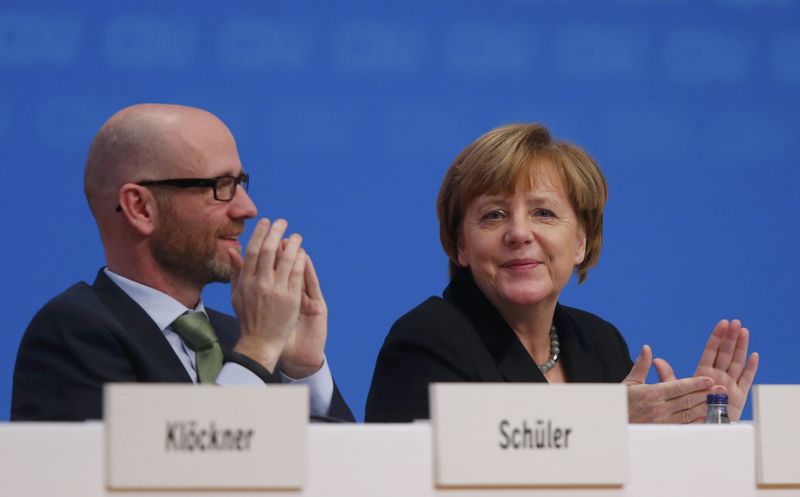By Paul Carrel and Noah Barkin
KARLSRUHE, Germany (Reuters) - German Chancellor Angela Merkel defended her refugee policies at a congress of her conservative party on Monday, fending off a challenge from critics with a pledge to reduce the influx of migrants and a repeat of her optimistic mantra "we can do this".
Named person of the year by both Time magazine and the Financial Times for her bold response to the crisis, Merkel has faced growing opposition at home to her open-door refugee policy and has begun hardening her position.
In a rousing speech, Merkel recounted a remarkable year that has seen Germany stand up to Russia over the Ukraine crisis, broker a deal to keep Greece in the euro zone, and welcome hundreds of thousands of refugees fleeing war and deprivation in the Middle East.
She said it had been a "humanitarian imperative" to open German borders to refugees camped out in Hungary back in August. But in a nod to critics within her Christian Democration Union (CDU), who have pressed her to introduce a formal cap on the number of migrants Germany will accept, she also said she would stem the flow.
"We want to, and we will, noticeably reduce the number of refugees," she said to applause at the congress in Karlsruhe, in the southwestern state of Baden-Wuerttemberg, which holds a state election next March.
Merkel, 61, won an eight-minute standing ovation at the end of her speech to about 1,000 CDU delegates in a conference centre adorned with posters reading "For Germany and Europe".
"She was combative, energetic, she enthused the delegates in Karlsruhe", German newspaper Die Zeit wrote.
Merkel's use of the phrase "noticeably reduce" came directly from a resolution the CDU leadership hastily reworked on the eve of the congress to head off an open rebellion over her refugee policy.
"That was very important as it is completely clear that another million isn't going to work," said Kristina Schroeder, a former family minister, in reference to the record one million migrants that have entered the country this year. "That would overburden Germany."
Grass roots party members also welcomed the tougher message.
"It was important," said Tobias Bringman, a party member from Stuttgart. "The whole spectrum, from left to right, must be brought along."
"WE CAN DO THIS"
Merkel defended her catch phrase "wir schaffen das", or "we can do this", by saying the party must show its Christian roots, and she likened it to pledges made by former conservative chancellors Konrad Adenauer and Helmut Kohl in troubled times.
"I can say this because it is part of the identity of our country to do the utmost," Merkel said.
"Germany should be a country that is open, curious, tolerant and even exciting," she added, painting an upbeat vision for the future and stressing how far the country had come since she took power a decade ago.
Back then, she said, Germany was known as the "sick man of Europe" and was struggling with record high unemployment numbers.
Merkel, a Protestant pastor's daughter who grew up in communist East Germany, has seen support for her party fall since the refugee crisis erupted in the late summer.
A poll by Emnid on Sunday put support for her conservative alliance of the CDU and their Bavarian allies at 37 percent, down from 43 percent in mid-August.

But the vibe in Karlsruhe was largely positive, in contrast to the mood in Berlin last week when the rival Social Democrats (SPD) held their own congress and sanctioned their leader Sigmar Gabriel for failing to make more of Merkel's vulnerability in the refugee crisis.